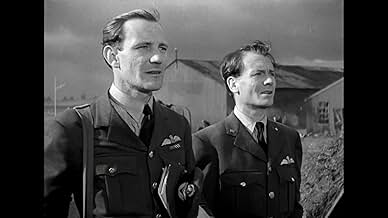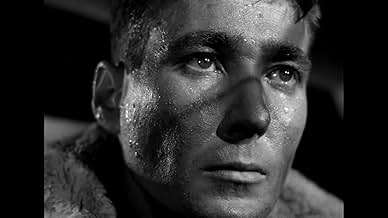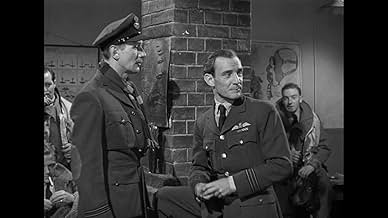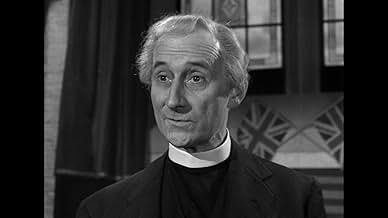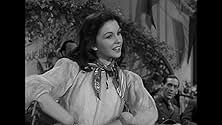La rutina diaria en tiempos de guerra en una base de bombarderos británica en el sureste de Inglaterra se revela a través de los ojos del recién llegado oficial de vuelo Peter Penrose (Sir J... Leer todoLa rutina diaria en tiempos de guerra en una base de bombarderos británica en el sureste de Inglaterra se revela a través de los ojos del recién llegado oficial de vuelo Peter Penrose (Sir John Mills).La rutina diaria en tiempos de guerra en una base de bombarderos británica en el sureste de Inglaterra se revela a través de los ojos del recién llegado oficial de vuelo Peter Penrose (Sir John Mills).
- Dirección
- Guión
- Reparto principal
- Premios
- 1 nominación en total
- Iris Winterton
- (as Renee Asherson)
- Joe Friselli
- (as Bonar Colleano Jnr)
- Col. Rogers
- (as Tryon Nichol)
- 'Nobby' Clarke
- (as Bill Rowbotham)
Reseñas destacadas
Above all, it's the Rattigan screenplay, with its wonderful trilogical structure that speaks out.
If you want to see how people really felt and acted in England in WW2, in a beautiful, tragic film, then you must see it.
Months later, I was looking through my local tv guide in the list of movies that were on. I noticed "The Way to the Stars", and some little bell in the recesses of my memory began to toll. I looked up the movie in my film guide -- and decided that I had to see it.
As it turned out, that was a very happy decision. Others of the Second World War generation might be able to identify with the people and the setting of the film. I cannot, but I loved this movie for all the other reasons -- it really is a wonderful movie, a sad (and heroic) story of people during the war. Critics might provide an analysis of plot, characterisation etc, as a reason why it's such a good movie. I won't bother. I'll merely give this summary: It's one of my favourite films, it deserves to be better known, and you should see it if you get the chance.
In making The Way to the Stars, director Anthony Asquith has crafted a war film not entirely about the death and destruction of that time but the good that comes out of pulling together and forging certain relationships. Would young pilot Peter Penrose (Mills) have met young Iris (Asherson) had The War not been on?; would young American pilot John Hollis (Montgomery) have bonded with public house owner Miss Todd (John) had The War not been on? Would she be the same person after The War had she not gone through what she experienced with a certain flight lieutenant? Certainly not, in fact one moment much later on sees both Hollis and Todd share a moment in which they reflect on the implausibility of Americans visiting the exact setting they share under normal circumstances. But that's not to say it doesn't remember the war dead entirely, despite channelling (through Asherson's character) a sense of romping on with business; that despite loosing her husband of two years to The War, the film disallows her to grieve too heavily and instead places her on a path that sees her continue her role to play upstanding hostess and fuel the local pilots with escapism in the form of alcohol and unity, as well as later interaction with said American.
The film is a really well observed character piece; focusing on and manifesting a number of relationships in and around both a local airfield which houses Allied bombers and a public house named The Golden Lion. In 1940, all sorts of Royal Air Force members retain that fighting spirit and keep their chins up as German bombing threatens the air field and general area. The men are unperturbed, taking cover and keeping spirits high by nattering about menial things to distract themselves in that manner most films of the era had them positively presented. The presentation of masculinity, particularly in those between a young and middle age is mostly positive and upbeat with a young graduate has an opportunity to lie to a senior about some test scores but concedes to the truth another pilot is seen to help out in the kitchen of that local pub-come-hotel as he woos the owner with poetry.
Hounesty; resilience; an eye for the arts and always keen to lend a helping hand is the order of the day as these positive masculine traits are played out under a banner of strength through teamwork and ability to both connect and link with those of other cultures. For a film about men and male pilots; female character Miss Todd is impressively given a fair share of development; while young, initially snappy Penrose attempts to court a young woman named Iris are thwarted by her domineering aunt, a resident at the hotel, who'll have nothing of it if it means veering too far away from her. Penrose's arc will see him initially adopt one of the lead roles, something we were led into believing may have been Todd's husband, a certain David Archdale (Redgrave), who's in charge of the airmen before marrying and being granted a fairer share of screen time. Penrose is then is allowed to develop from a young hot-head into a calmer, more rueful and thoughtful young man more-so by way of the effects of the war on the home and those around him than any 'action' he saw overseas.
The film has a little more fun when the Americans arrive in '42, respectfully shifting tracts from loss of a friend and lover to a more comedic tone running on a clashing of cultures in detailing the differences in sports, beverages and sandwich fillings these two sides share. Their obvious initial ill-fitting to the locale exemplified in their upsetting of the 'old guard' in Iris' elderly aunt when she fails to connect with the young American pilots and their leisurely habits. That's not to say they're limited to alienated clowns though, as a certain Johnny Hollis will go on to take a rather predominant role; he himself alienated away from home and here rendering the piece not of a wholly begging ilk destined to highlight how solely bad the British had it. Through Hollis, the idea is that nationality is immaterial. In restricting his servants of The War to bombers and bombardiers, Asquith is reliant on how the effects of missions affect the life back home on the ground and in this sense, succeeds, culminating in a worthy effort that's worth seeing.
While this is a film about bomber crews, no shots of the crews on missions are used and most of the action takes place at a pub next to the base. Here, the crew members unwind and you learn about them as their characters slowly reveal themselves. What I particularly liked is that there were no bigger than life heroes here--just decent men who bravely did their jobs and tried to maintain their sanity through it all. Because of this, the performances were generally understated and realistic--like we are peering through a window into the past. Also, and I don't want to reveal any specifics, I liked how many of the main characters died through the course of the film--heightening both the realism and reminding us just how high the cost was for freedom.
Exceptional acting, writing and direction make this one of the better war films of the era and in many ways is like an aerial version of IN WHICH WE SERVE. Superb.
¿Sabías que...?
- CuriosidadesThe poem "For Johnny" read by Sir John Mills is as follows: "Do not despair, For Johnny-head-in-air; He sleeps as sound, As Johnny underground. Fetch out no shroud, For Johnny-in-the-cloud; And keep your tears, For him in after years. Better by far, For Johnny-the-bright-star, To keep your head, And see his children fed."
- PifiasAs the American pilot alights to join the first US bombers leaving to bomb the Nazis on "Aug. 17" (1942) his Mae West is visibly stenciled: "Insp 5/3/44" .
- Citas
Squadron Leader Sil Carter: Well, chaps, as you know the target for this afternoon is exactly the same as yesterday's, and the day before yesterday's, and the day before that. Calais. Barge concentrations.
- Créditos adicionalesThe end credits play over a night sky showing a crescent moon and many stars.
Selecciones populares
- How long is Johnny in the Clouds?Con tecnología de Alexa
Detalles
- Fecha de lanzamiento
- País de origen
- Idioma
- Títulos en diferentes países
- Johnny in the Clouds
- Localizaciones del rodaje
- The Golden Lion Hotel, 114 High Street, Northallerton, North Yorkshire, Inglaterra, Reino Unido(exteriors of village pub)
- Empresa productora
- Ver más compañías en los créditos en IMDbPro
- Duración1 hora 49 minutos
- Color
- Relación de aspecto
- 1.37 : 1
Contribuir a esta página


